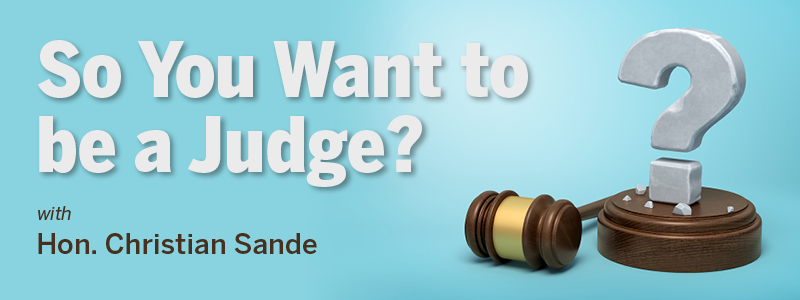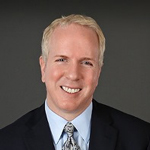
 What motivated you to start the application process to become a judge?
What motivated you to start the application process to become a judge?
I've always been interested in the connection of people with their government. A district court judge is the key person between people and the judicial branch. I quote a good friend of mine, Judge Kevin Burke, who wrote that we want people to leave the courthouse being able to say, “I was heard. I was treated with respect. I understand the decision.” A judge makes or breaks that experience.
Another reason was diversity, the need for people to see and be heard by judges from diverse backgrounds, and the ability to serve as a member of the LGBTQ+ community. Honestly, I didn’t grasp the importance of that representation until later in my legal career, in large part because Lockridge Grindal Nauen was so supportive of me that I didn’t have to consider how it could have gone in another direction. I was fortunate not to have had a bad professional experience as a gay person. But when I ran for office and traveled around the state, I met many LGBTQ+ people who had negative or unfortunate experiences. They were thrilled to see a member of their community out and active in public service. It was humbling and empowering—and motivating.
What was one thing that surprised you about the application and onboarding process?
I had no idea what to expect from the application process. I applied, was interviewed, and didn’t have a clue how I did until the whole thing was done. The Commission on Judicial Selection members are pretty good at playing poker. I can’t say it was a comfortable process. Any situation where you are putting yourself out there in front of strangers, and trying to be open and honest about your views and experiences, is going to be a bit uncomfortable. That’s just how it is.
From the start, I was told that the process is not political and certainly not patronage. We trust the people on the Commission, and the Governor, to make a good decision when it comes to judicial appointments. Judging them by their actions over the past two decades, they have earned our trust. I’ve served over five years now with judges who were appointed by governors from three different political parties. I can confidently say the process works well and the political battles over the judiciary that we see in other states have not bled into Minnesota.
What’s one piece of advice you would have for someone who wants to become a judge?
I think people need to understand what the job is. It is a public service job. District Court Judges don’t only deal with big companies in civil lawsuits, or high-profile criminal cases. More often we see everyday people in their everyday lives. If you don't like that or don't want to deal with that, then this isn't the job for you. You can’t roll your eyes. It’s a constant endeavor as we hear cases and apply the law to remember how we make people feel.
In addition to patience and temperament, I think a crucial part of this job is to be intellectually curious and to have an open mind. We’re general practitioners. Judges need to be willing to learn about areas of law they are unfamiliar with. You better like to read.
I should also comment about the pay. Minnesota judges are paid the same statewide. I believe our salary is now less than what the large firms pay first-year associates. The Legislature has been willing to consider salary adjustments but, to be real, there is never going to be a big raise. It’s still a good salary and there’s a nice pension. And there are many other pluses. My colleagues on the bench are such a pleasure to work with and learn from. We have remarkable and top-notch support from the people who work for the courts (attorneys and non-attorneys). We get a front row seat to fascinating legal issues and get to see some of the best lawyers in the nation. This is a great job. But if someone is hung up on money, then being a judge isn't the job for them.
What’s one thing you wish you knew before you started the process?
When I first started the process, I thought it was more like filling out an application and being interviewed by a committee. As you get to preparing the application materials and talking with people, it becomes pretty introspective. You have to think about what the job is, why you want to be a judge, what you hope to accomplish, and how you're going to confront some of the issues facing the courts.
Each applicant, just like each judge, needs to consider how they address fairness in the courts, and what they think they can do make everyone feel treated fairly and fully heard. When I started thinking about these issues, I generalized and tried to create an argument that because I’m LGBT, I know what it’s like to face discrimination. There may be something to that, but I don’t know what it’s like to feel like I’ve been followed around a store or stopped while driving just because I’m gay. We all like to generalize, but in so many cases that just doesn’t work. The application process got me thinking carefully about obvious and subtle distinctions, in addition to my own privilege.
Applying to be a judge took more soul searching than I thought it would. It turned into thinking about what I value, why I wanted the job, and what I thought would make me good at it. But really thinking that stuff through put me in a better position to sell myself to the Commission and to the Governor.
Is there anything else you wanted to mention about the process?
I think people are afraid to approach members of the Commission. I've never found people on the Commission to be unwilling to talk with potential applicants. Commission members give their time and effort to serve in a position that takes a lot of work. They’re serving in that position because they are invested in our courts, and they want our system to serve the public in the best way possible. Potential applicants should contact a Commission member to learn more before there is an opening posted. I spoke with several members of the Commission before I applied. They welcomed my questions. It was invaluable to me, and I’m glad I did it.